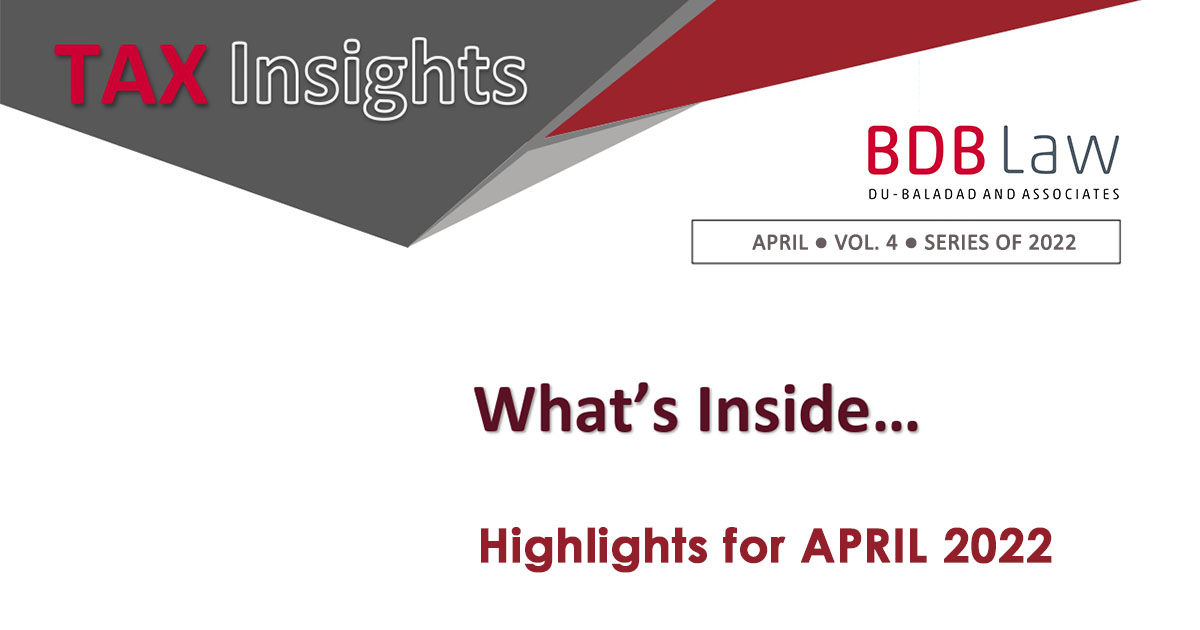


APRIL • VOL. 4• SERIES OF 2022
INSIGHTS is a monthly publication of BDB LAW to inform, update and provide perspectives to our clients and readers on significant tax-related court decisions and regulatory issuances (includes BIR, SEC, BSP, and various government agencies).
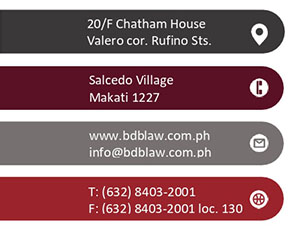
DISCLAIMER: The contents of this Insights are summaries of selected issuances from various government agencies, Court decisions, and articles written by our experts. They are intended for guidance only and as such should not be regarded as a substitute for professional advice.
Copyright © 2022 by Du-Baladad and Associates (BDB Law). All rights reserved. No part of this issue covered by this copyright may be produced and/or used in any form or by any means – graphic, electronic, and mechanical without the written permission of the publisher.
What's Inside ...
- HIGHLIGHTS FOR APRIL 2022
- SIGNIFICANT COURT DECISIONS
- Supreme Court
- Court of Tax Appeals
- SIGNIFICANT REGULATORY ISSUANCES
- Bureau of Internal Revenue
- Securities and Exchange Commission
- Insurance Commission
- Bangko Sentral Ng Pilipinas
- Bureau of Customs
- Fiscal Incentives Review Board
- PUBLISHED ARTICLE
- REGULATING NFTs: A TAX PERSPECTIVE
- OUR EXPERTS
- The Personalities
- The Personalities


HIGHLIGHTS for APRIL 2022
SUPREME COURT DECISIONS
- In claiming a refund for unutilized CWT, the amount of income payments in the ITR must correspond and tally with the amount indicated in the CWT. (Marionnaud Philippines, Inc. v. CIR, G.R. No. 244428, June 28, 2021)
COURT OF TAX APPEALS DECISIONS
- There is no indefiniteness in the amount of tax liability even with the statement that the interest shall be adjusted if paid beyond the due date provided. (Commission of Internal Revenue v. Robinsons True Serve Hardware Philippines, Inc., CTA EB No. 2293, March 1, 2022)
- When there is an assessment notice, it behooves the concerned taxpayer to file a written protest letter against it, regardless of whether or not there was payment of the assessed tax. (City of Makati and Jesusa Cuneta as City Treasurer of the City of Makati v. Global Business Power Corporation, CTA AC No. 235, March 1, 2022)
- The Mission Order cannot replace, supplant, or be converted to an LOA. (Formula Sports Inc. v. Commission of Internal Revenue, CTA Case No. 9625, March 2, 2022)
- Should the taxpayer, on the date of his filing, manifest that he no longer wishes to submit any other additional documents to complete his administrative claim, the 120-day (now 90-day) period allowed to the CIR begins to run from the date of filing. (Carmen Copper Corporation v. CIR, CTA EB No. 2339, March 17, 2022)
- Compensatory interest, or the legal interest imposed by the courts on a judgment award in favor of a party litigant, is considered a form of penalty or indemnity for damages, it cannot rightfully be considered as taxable income. (CIR v. Oñate, CTA EB No. 2370, March 18, 2022)
BIR ISSUANCES
- RMC No. 23-2022, March 9, 2022 – This suspends the Income Tax incentives granted to Registered Business Enterprises (RBEs) for violating the Work-From-Home (WFH) threshold as prescribed by the Fiscal Incentives Review Board
- RMC No. 24-2022, March 11, 2022 – This clarifies issues relative to RR No. 21-2021 implementing the amendments to the Value-Added Tax (VAT) zero rating provisions under Sections 106 and 108 of the National Internal Revenue Code of 1997 (Tax Code), in relation to Sections 294(E) and 295(D), Title XIII of the Tax Code, introduced by RA No. 11534 (CREATE Act), and Section 5, Rule 2 and Section 5, Rule 18 of the CREATE Act Implementing Rules and Regulations
- RMC No. 28-2022, March 16, 2022 – This prescribes the guidelines in the submission of Certificate of Entitlement to Tax Incentives (CETI) under RA No. 11534 (CREATE Law).
- RMC No. 32-2022, March 30, 2022 – This clarifies the tax treatment of the Philippine Amusement and Gaming Corporation (PAGCOR), its licensees and contractees.
- RMC No. 35-2022, March 31, 2022 – This prescribes the tax treatment of Murabahah (Profit Disclosed Sale) and Tawarruq (Commodity Murabahah) as Islamic Banking Arrangements pursuant to the tax neutrality provision of RA No. 11439 (An Act Providing for the Regulation and Organization of Islamic Banks) and as implemented by RR No. 17-2020
SEC ISSUANCES
- SEC MC No. 03 s. 2022, March 1, 2022 – This implements the Bangko Sentral ng Pilipinas Circular No. 1133 Series of 2021 on the Ceiling/s on Interest Rates and Other Fees Charged by Lending Companies, Financing Companies, and their Online Lending Platforms
- SEC MC No. 04 s. 2022, March 2, 2022 – This provides for the disqualification of Directors, Trustees and Officers of Corporations and the Guidelines on the Procedure for their Removal
- SEC MC No. 05 s. of 2022, March 8, 2022 – This provides for the guidelines on Corporate Dissolution under Sections 134, 136 and 138 of the Revised Corporation Code
IC ISSUANCES
- IC Circular Letter 2022-09, March 2, 2022 – This provides for the guidelines on the Licensing Requirements of Insurance and/or Reinsurance Brokers Engaged in Health Maintenance Organization (HMO) Business
- IC Circular Letter 2022-10, March 2, 2022 – This provides for the revised Guidelines on Online Submission of Requests for Approval of Products/Forms or Any other Related Requests
- IC Circular Letter 2022-14 dated March 14, 2022 – This provides for the adoption of Philippine Financial Reporting Standards (PFRS) 4 – Insurance Contracts
- IC Circular Letter 2022-17 dated March 18, 2022 - This provides for the guidelines on materiality threshold to be applied by external auditors/auditing firms
- IC LO-2022-09 dated March 23, 2022 – Opinion on designation as a policyholder of the group insurance
BSP ISSUANCES
- BSP Circular No. 1139, March 23, 2022 - This provides for guidelines for reporting Islamic Banking and Finance Transactions / Arrangements
- BSP Circular Letter No. CL-2022-021, March 7, 2022 - This provides for the Anti-Money Laundering Council (AMLC) Resolution No. TF-50, directing the issuance of Sanctions Freeze Orders (SFO) against certain identified organizations pursuant to their designation as terrorists.


In establishing a claim for refund of CWT, the claimant need only prove that taxes were actually withheld.
The taxpayer had unutilized CWT for the CY 2012 and 2013. It filed an administrative claim, and subsequently a petition before the CTA, for the issuance of TCC for its alleged unutilized CWT for CY 2012 and 2013. The CTA partially granted the claim for issuance of TCC for the unutilized CWT.
Aggrieved, the BIR appealed to the Supreme Court insisting that proof of actual remittance of the withholding taxes is required for the claim for refund to prosper. In insisting proof of actual remittance, the BIR opined that it is incumbent upon the taxpayer-claimant to prove that the taxes withheld were actually remitted to the BIR by the withholding agents, not for the BIR to prove non-remittance of the same.
The Supreme Court upheld the decision of the CTA En Banc in that proof of actual remittance is not necessary for the taxpayer’s claim for refund of excess or unutilized CWT to prosper. Notably, it is the payor-withholding agent, and not the payee-refund claimant such as the taxpayer, who is vested with the responsibility of withholding and remitting income taxes. In establishing a claim for refund of CWT, the claimant need only prove that taxes were actually withheld through the presentation of the certificates of withholding issued by the corresponding withholding agents. (Commissioner of Internal Revenue vs. Ayala Corporation, G.R. No. 256539, July 28, 2021 [Date uploaded: 9/22/2021])

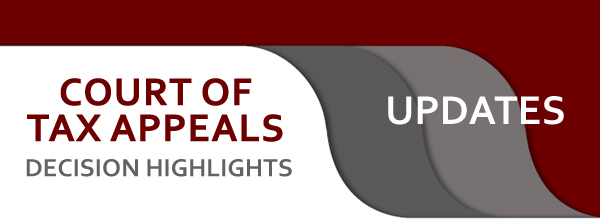
There is no indefiniteness in the amount of tax liability even with the statement that the interest shall be adjusted if paid beyond the due date provided.
The CTA Division voided the subject assessments as the amount due remains indefinite because the FLD states that the interest “will be adjusted if paid beyond the date specified therein.” The CTA En Banc reversed the CTA Division explaining that the basic deficiency tax liability remains the same regardless of when the taxpayer chooses to pay the assessment. The interest, and only the interest, may be adjusted if the taxpayer pays before or after the due date. What is important is that there is a due date contained in the FLD/FDDA/assessment notice. Thus, even with the statement that the interest shall still be adjusted if paid beyond the due date provided, there is no indefiniteness, since it is only the interest that shall be adjusted. (Commission of Internal Revenue v. Robinsons True Serve Hardware Philippines, Inc., CTA EB No. 2293, March 1, 2022)
When there is an assessment notice, it behooves the concerned taxpayer to file a written protest letter against it, regardless of whether or not there was payment of the assessed tax.
There was a Notice of Assessment issued against the taxpayer assessing it with deficiency local business tax on dividend income. The taxpayer did not file a protest and paid the assessed amount. It then filed a claim for refund pursuant to Sec. 196 of the LGC of 1991 on the ground that it is not liable for local business tax on its dividend income. The City Treasurer argues that the taxpayer failed to file a protest to the assessment pursuant to Sec. 195 of the LGC of 1991 making the assessment final and executory.
The Court ruled that when there is an assessment notice, it behooves the concerned taxpayer to file a written protest letter against it, regardless of whether or not there was payment of the assessed tax; otherwise, the assessment shall become final and executory, and thus, the refund being claimed, if any, shall not perforce be forthcoming.
It appears that no protest against the said Notice of Assessment was lodged by taxpayer before the City Treasurer, the same has become final and executory. (City of Makati and Jesusa Cuneta as City Treasurer of the City of Makati v. Global Business Power Corporation, CTA AC No. 235, March 1, 2022)
The Mission Order cannot replace, supplant, or be converted to an LOA.
The use of a Mission Order is different from an LOA. A Mission Order is issued to authorize the surveillance, not the audit and assessment, of the taxpayer. Revenue Memorandum Order ("RMO'') No. 003-09 provides that if the result of the surveillance made indicates that the taxpayer has not been reporting its correct income for tax purposes, and/or the veracity of its accounting records is not reliable, an LOA must still be issued in order to cause the audit and assessment of the taxpayer.
The Mission Order cannot replace, supplant, or be converted to an LOA, considering that the functions of both issuances are different from each other. (Formula Sports Inc. v. Commission of Internal Revenue, CTA Case No. 9625, March 2, 2022)
Should the taxpayer, on the date of his filing manifest that he no longer wishes to submit any other addition documents to complete his administrative claim, the 120-day (now 90-day) period allowed to the CIR begins to run from the date of filing.
From the date an administrative claim for excess unutilized VAT is filed, a taxpayer has thirty (30) days within which to submit the documentary requirements sufficient to support his claim, unless given further extension by the CIR. Should the taxpayer, on the date of his filing manifest that he no longer wishes to submit any other addition documents to complete his administrative claim, the 120-day (now 90-day) period allowed to the CIR begins to run from the date of filing.
The taxpayer filed its administrative claims for refund for the 1st and 2nd quarters of CY 2012 on August 12, 2013 and December 17, 2013, respectively; while for the 3rd and 4th quarters of CY 2012, both were filed on March 19, 2014. It did not allege any other dates as to when it filed its supporting documents. Hence, the reckoning dates for the start of the running of the 120-day period are August 12, 2013, December 17, 2013 and March 19, 2014. The First and Second Notices issued by the BIR and received by the taxpayer on September 5, 2014 and November 20, 2014, respectively, which partially denied the taxpayer's administrative claims, are without effect, since the 30-day period after the expiration of the 120-day period came sooner than the 30-day period from the said dates of receipt. (Carmen Copper Corporation v. CIR, CTA EB No. 2399, March 17, 2022)
Compensatory interest, or the legal interest imposed by the courts on a judgment award in favor of a party litigant, is considered a form of penalty or indemnity for damages, it cannot rightfully be considered as taxable income.
The taxpayer obtained a favorable ruling from the Supreme Court finding that as a consequence of Land Bank’s failure to prove the source of the "miscredited" fund, it had no right to debit the amount from the taxpayer’s trust fund account and must, therefore, return the same with legal interest. Land Bank finally paid the taxpayer the judgment award less the 20% final tax withheld on interest/yield from bank deposits/deposit substitutes. The taxpayer filed a written claim for refund or tax credit for the said amount alleging that the interest awarded should not be subject to income tax.
It was established and remains undisputed that the monetary award received by the taxpayer was based on Land Bank of the Philippines v. Emmanuel Onate, consisting of the undocumented withdrawals from his trust accounts plus interest. The legal interests imposed in the Supreme Court's judgment award was imposed by the Supreme Court as a form of indemnity for the interest of the funds or capital lost by the taxpayer and would have earned had they not been wrongfully withdrawn by Land Bank. Considering that compensatory interest, or the legal interest imposed by the courts on a judgment award in favor of a party litigant, is considered a form of penalty or indemnity for damages, it cannot rightfully be considered as taxable income. (CIR v. Oñate, CTA EB No. 2370, March 18, 2022)

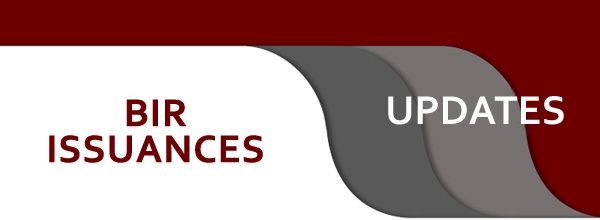
RMC No. 23-2022,
March 9, 2022
This suspends the Income Tax incentives granted to Registered Business Enterprises (RBEs) for violating the Work-From-Home (WFH) threshold as prescribed by the Fiscal Incentives Review Board.
The non-compliance with all the conditions prescribed under FIRB Resolution Nos. 19-21 and 23-21 shall be meted with suspension of the Income Tax incentive on the revenue corresponding to the months of non-compliance. Hence, RBE shall pay the Income Tax using the regular rate of either twenty-five percent (25%) or twenty percent (20%) based on the taxable net income corresponding to the months the RBE has violation. For RBEs with no existing transactions subject to the regular Income Tax rate, BIR Form 1702-MX shall be used for the voluntary payment of the Income Tax due on the months with reported violation.
However, for RBEs which have existing transactions subject to regular Income Tax rate, the voluntary payment shall be made through BIR Form 0605 and bank-validated copy of which shall be attached in the Annual Income Tax Return (AITR) to be filed. In both cases, the computation of the Income Tax due shall be:
Net taxable income* for the year / 12 months ……………….. ₱ xxxx.xx
Multiply by the applicable rate of either 25% or 20% …….. X %
Income Tax Due ……………………………………………………………… ₱ xxxx.xx
*Computed based on existing policies which is net of allowable deduction
In the absence of voluntary payment by RBEs or the voluntary payments made is not sufficient, the RBE shall be subjected to an audit pursuant to a Letter of Authority (LOA).
RMC No. 24-2022,
March 11, 2022
This clarifies issues relative to RR No. 21-2021 implementing the amendments to the Value-Added Tax (VAT) zero rating provisions under Sections 106 and 108 of the National Internal Revenue Code of 1997 (Tax Code), in relation to Sections 294(E) and 295(D), Title XIII of the Tax Code, introduced by RA No. 11534 (CREATE Act), and Section 5, Rule 2 and Section 5, Rule 18 of the CREATE Act Implementing Rules and Regulations.
Prior to CREATE, the cross-border doctrine governs the sale of goods and services by a VAT-registered seller from the customs territory to registered business entities (“RBE”) within the ecozone or freeport which is treated as constructive export subject to zero percent (0%) VAT.
With the passage of CREATE, the cross-border doctrine has been rendered ineffectual and inoperative for VAT purposes because:
- CREATE expressly provided that only those goods and services that are directly and exclusively used in the registered project/activity of the RBE qualify as VAT 0% local purchases;
- CREATE and its IRR stated certain parameters for the availment of VAT zero-rating on local purchases of registered export enterprises, regardless of location; and
- VAT zero-rate provisions now provide that the effectively zero-rated sales shall apply only to sales of goods and services rendered to persons or entities who have direct and indirect tax-exemption granted pursuant to special laws or international agreements to which the Philippines is a signatory.
With the passage of CREATE, the following rules govern the enjoyment of VAT exemptions and zero-rated incentives for RBEs:
- Enterprises registered with the Investment Promotion Agencies (“IPAs”) shall now be governed by CREATE with respect to the availment of tax incentives, including VAT exemption of RBEs enjoying the 5% gross income earned or special corporate income tax.
- Enterprises registered prior to CREATE shall continue to enjoy VAT exemptions and zero-rating on local purchases of goods and services provided that it shall only apply to goods and services directly attributable to and exclusively used in the registered project/activity of the export enterprise during the period of registration until the expiration of the transitory period under Section 311 of the 1997 NIRC, as amended.
Enterprises located within ecozones and freeports still invoke Sections 106(A)(2)(b) [on transactions deemed sale] and 108(B)(3) [on services rendered to persons or entities exempt under special laws or international agreements to which the Philippines is a signatory] of the 1997 NIRC, as amended, after the effectivity of CREATE cannot claim VAT zero-rating on local purchases of goods and services. These business enterprises shall only be accorded VAT zero-rating on local purchases of goods and/or services that are directly and exclusively used in the registered project or activity of the registered export enterprises.
| The VAT treatment for the sale of goods and services that transpired during the effectivity of RR No. 9-2021 or from June 27, 2021 to June 30, 2021 | The seller should declare the same as subject to 12% VAT. |
|
Consequently, the buyer:
|
| SELLER | BUYER | |
| The VAT treatment for the sale of goods and services that transpired during the effectivity of RR No. 9-2021 or from June 27, 2021 to June 30, 2021 | The seller should declare the same as subject to 12% VAT. |
Consequently, the buyer:
|
| VAT treatment for sale of goods and services that transpired during the effectivity of RR No. 9-2021 or from July 1, 2021 to July 27, 2021, which is covered by the retroactive application of RR No. 21-2021. |
Retain the transaction as subject to Revert the transaction from VATable to zero-rated wherein the seller may amend the VAT return after reimbursing/returning the VAT paid by the buyer. The adjustment to sales shall only be to the extent of the reimbursed VAT. The resulting overpayment due to the unutilized input tax credits, if any, may be recovered through VAT refund. |
|
Should the seller revert the transaction from VATable to zero-rated, the seller shall retrieve the same for cancellation and replacement with a zero-rated SI/OR. A list shall be prepared by the seller containing the VAT SI/OR cancelled together with the corresponding zero-rated SI/OR replacement subject to validation by the BIR.
- The treatment on the sale of goods and/or services by a VAT-registered seller to registered export enterprises, regardless of location, enjoying fiscal incentives under CREATE.
- The said transactions shall be treated as VAT zero-rated. However, it shall apply only to goods and/or services directly and exclusively used in the registered project or activity for a maximum period of 17 years from date of registration, unless extended under the SIPP.
- The enjoyment of VAT exemption and duty incentives is reckoned from the date of registration and throughout the period as indicated in its Certificate of Registration.
- The term date of registration shall refer to the date of registration of the registered project or activity as reflected in the Certificate of Registration issued by the concerned IPA.
Only the purchases of goods and services that are directly and exclusively used in the registered project or activity shall be allowed for VAT zero-rating.
| Tax treatment | |
| Sales by registered non-export enterprises or DMEs located in ecozones and freeports to registered export enterprises and non-RBEs |
The DME under the 5% GIT or SCIT regime and registered as VAT exempt shall treat its revenues as VAT exempt. The VAT passed on to it by VAT-registered local suppliers shall form part of its costs or expenses |
| Sale made by a registered export enterprise to another registered export enterprise |
The following rules shall apply (even to the sale of a DME to a registered export enterprise):
|
ON TAXABILITY OF EXISTING EXPORT ENTERPRISES REGISTERED PRIOR TO CREATE
| VAT treatment of the imported capital equipment, raw materials, spare parts, and accessories were utilized in the non-registered project or activity | |
| For full utilization | For partial utilization |
| The corresponding VAT on importation should be paid accordingly | The amount corresponding to the VAT on a capital equipment, raw materials, spare parts, or accessories shall be paid in proportion to its utilization for the non-registered project or activity. |
| Transactions | Tax Treatment |
| Sale of goods or services to existing registered non-export enterprises located inside the ecozones of freeports | VAT at 12% |
| Sale of goods or services by existing registered non-export enterprises located inside the ecozones of freeports | 5% GIT or SCIT regime and registered as VAT exempt shall treat its revenues as VAT exempt. The VAT passed on to it by VAT-registered local suppliers shall form part of its costs or expenses. |
| Sale by VAT-registered seller to registered export enterprises registered with the BOI and IPAs other than PEZA or Freeport zones | These sales are subject to VAT at zero-rate but shall only apply to goods and services directly and exclusively used in the registered project or activity of the registered export enterprise until the expiration of the transitory period or the remaining period of the incentives. |
| Sale of processing, manufacturing, or repacking of goods by a PEZA-RBE for other persons doing business outside the Philippines which goods are subsequently exported, where the services are paid for in acceptable foreign currency and accounted for in accordance with the rules and regulations of the BSP | The sales, if made by a PEZA-RBE entitled to the 5% GIT, are exempt from VAT. In this case, the service fee shall be indicated in the OR and VAT returns as a VAT exempt sale. |
| Sale of raw materials or packaging materials by a PEZA-RBE to a non-resident buyer for delivery to a resident local export-oriented enterprise to be used in processing, manufacturing, packaging, or repacking in the Philippines of the said buyer’s goods and paid for in acceptable foreign currency and accounted for in accordance with the rules and regulations of the BSP | The sales, if made by a PEZA-RBE entitled to the 5% GIT, are exempt from VAT. |
NOTES:
- The registered export enterprise is required to change its status from a VAT-registered entity to Non-VAT within 2 months from the expiration of its ITH.
- Registered export enterprises enjoying GIT or SCIT regime but are still VAT-registered upon effectivity of CREATE are required to change its registration status within 2 months from the effectivity of this Circular.
The following rule applies to registered export enterprises with multiple incentives regime as they have more than one registered activity:
- The registered export enterprise shall remain VAT-registered until the expiration of the ITH for all registered activities and all its activities are covered by the 5% GIT.
- The registered export enterprise shall report as VAT exempt the sales under the 5% GIT as provided as follows:
- If the seller is VAT-registered while enjoying ITH – Subject to VAT at zero-rate provided that the goods and services are directly and exclusively used in the latter’s registered project or activity.
- If the seller is enjoying 5% GIT, the sale of goods and/or services shall be VAT-exempt.
- The sales under the ITH shall be reported in the VAT return as 0% VAT.
| VAT treatment should the RBE sell, transfer, or dispose the previously VAT-exempt imported capital equipment, raw materials, spare parts and accessories | |
| If the purchaser is a registered export enterprise | If seller is non-registered export enterprise or a DME, regardless of location, and is under the following regimes |
| the transaction is subject to VAT at zero-rate provided that the goods and services are directly and exclusively used in registered project or activity of the registered export enterprise. |
If seller is non-registered export enterprise or a DME, regardless of location, and is under the following regimes
|
ON APPLICATION FOR VAT ZERO-RATING
- VAT zero-rating on local purchases shall only apply to goods and services directly and exclusively used in the registered project or activity of the registered export enterprise upon endorsement of the concerned IPA, in addition to documentary requirements of the BIR.
- Absence of prior approval may result in the disallowance of the VAT zero-rated sale of the supplier.
- IPA shall issue annually a VAT zero percent certification only to registered export enterprises which shall indicate:
- registered export activity;
- tax incentives entitlement under agreed terms and conditions with the validity period; and
- the applicable goods and services and other expenditures directly attributable to the registered project or activity without which the registered project or activity cannot be carried out.
- All IPAs are required to submit to the BIR the list of RBEs categorized as export enterprise for purposes of VAT zero-rating.
ON REFUND BY LOCAL SUPPLIERS AND RECOVERY OF INPUT VAT PASSED ON TO REGISTERED EXPORT ENTERPRISES
- In addition to the documentary requirements under existing revenue issuances, the supplier-applicant of the RBE-buyer shall be required to submit upon filing of the claim for VAT credit or refund the approved application for VAT zero-rating.
- No VAT shall be passed on the registered export enterprise on its purchases of goods and services directly and exclusively used in the registered project or activity.
- Should the local supplier inadvertently passed on VAT, the registered export enterprise may contest the same and/or resolve the reimbursement of VAT paid, if any. The previously issued SI/OR must be surrendered/returned to the local supplier for cancellation and replacement.
VAT paid or incurred for purchases not directly and exclusively used in the registered project or activity of the registered export enterprise are not allowed for VAT refund. However, the following options may be availed of:
a. If VAT-registered and enjoying ITH – claim the passed-on VAT as input tax credit and apply against future output VAT liabilities; or
b. Should there be no VATable sales – accumulate the input tax credits and claim as VAT refund upon expiration of the VAT registration; or
c. If non-VAT registered, charge to cost or expense account.
RMC No. 28-202,
March 16, 2022
This prescribes the guidelines in the submission of Certificate of Entitlement to Tax Incentives (CETI) under RA No. 11534 (CREATE Law).
Pursuant to the provisions of Section 3 under Rule 8 of the Implementing Rules and Regulations (IRR) of the CREATE Law, all Registered Business Enterprises (RBEs) shall apply for a CETI with their concerned Investment Promotion Agency (IPA) prior to the filing of Annual Income Tax Return (AITR). The CETI shall then be attached to the AITR filed with the BIR.
The CETI is a requirement for all RBEs in order to avail of the Income Tax Holiday or preferential rate granted by the CREATE Law. This repeals the provisions stated in Revenue Memorandum Circular No. 14-2012, which required the submission of the Certificate for Entitlement to Income Tax Holiday (now CETI), within thirty (30) days from filing of the RBE's AITR.
.
RMC No. 32-2022
March 30, 2022
This clarifies the tax treatment of the Philippine Amusement and Gaming Corporation (PAGCOR), its licensees and contractees.
| Subject Matter | Tax Treatment |
| PAGCOR | |
|
Income from its operations and licensing of gambling casinos, gaming clubs, gaming clubs and other similar recreation or amusement places, gaming pools are. This includes, among others:
|
Subject to the five percent (5%) franchise: tax *There is no distinction on whether the taxes are direct or indirect |
|
Income from "other related operations/services" This includes, among others, but is not limited to: |
Corporate Income Tax, VAT and other applicable taxes |
| Income from other necessary and related services, shows and entertainment | |
| Other income that are not connected with the foregoing operations. | Corporate Income Tax, VAT and other applicable taxes |
| PAGCOR’S LICENSEES, IN GENERAL | |
| Income from gaming operations | 5% Franchise Tax in lieu of corporate income tax Generally subject to VAT (unless the licensee is also a contractor in which case the sales of goods/services in connection with the gaming operations are subject to VAT at zero percent [0%]). |
| Income from other related operations/services | Corporate Income Tax, VAT and other applicable taxes. |
| PAGCOR’S LICENSEES IN ECOZONES/FREEPORTS | |
| Income from gaming operations | Income from gaming operations |
| Payment of compensation to employees and income payments to individuals or corporations | Payment of compensation to employees and income payments to individuals or corporations |
| Income from other related operations/services which are covered by their registered activity | Income from other related operations/services which are covered by their registered activity |
| Income from other related operations/services which are not covered by their registered activity | Income from other related operations/services which are not covered by their registered activity |
| PAGCOR’S CONTRACTEES | |
| Income from gaming operations |
5% Franchise Tax In lieu of corporate income tax Subject to VAT at 0% |
| Non-gaming revenues or income from other related operations/services | Corporate Income Tax, VAT and other applicable taxes |
RMC No. 35-2022,
March 31, 2022
This prescribes the tax treatment of Murabahah (Profit Disclosed Sale) and Tawarruq (Commodity Murabahah) as Islamic Banking Arrangements.
This prescribes the tax treatment of Murabahah (Profit Disclosed Sale) and Tawarruq (Commodity Murabahah) as Islamic Banking Arrangements pursuant to the tax neutrality provision of RA No. 11439 (An Act Providing for the Regulation and Organization of Islamic Banks) and as implemented by RR No. 17-2020.
Any reference to interest shall apply to gains or profits received and expenses incurred in Islamic banking arrangements, in lieu of interest income and/or expenses under the conventional banking transactions.
The economic substance of a Murabahah Financing (Profit Disclosed Sale) is equivalent to a conventional mortgage loan.
Tax Neutrality (in Murabahah Financing):
| Conventional Mortgage Financing | Islamic Finance Arrangement | |
| Bank/IB/IBU |
Interest income derived from mortgage financing shall be subject to regular Income Tax and Gross Receipts Tax. However, the Withholding Tax herein shall apply whenever the payor is classified as top withholding agent. |
Gains or profits derived from Islamic finance arrangement shall be subject to regular Income Tax and Gross Receipts Tax. However, the Withholding Tax herein shall apply whenever the payor is classified as top withholding agent.: Provided, That the effective profit method shall be used in calculating the amortized cost of the subject financial instruments measured at amortized cost and of allocating the income or expense over the relevant period |
| Borrower/ Client/ Customer |
Interest payments made by the borrower shall not be subject to Withholding Tax. However, the Withholding Tax herein shall apply whenever the payor is classified as top withholding agent. |
Gains or profits payments made by the customer shall not be subject to Withholding Tax. However, the Withholding Tax herein shall apply whenever the payor is classified as top withholding agent. |
| Mortgage instruments executed shall be subject to Documentary Stamp Tax (DST). | Equivalent Islamic finance instruments executed shall be subject to Documentary Stamp Tax (DST), which shall be computed on the basis of the equivalent amount actually loaned or given at the time of execution of the mortgage, pledge or deed of trust under the conventional mortgage transaction. | |
| Real Property Finance: Transfer of real property from the seller to the borrower/buyer shall be subject to Capital Gains Tax (CGT) if the land was held as capital asset or Creditable Withholding Tax (CWT) and ValueAdded Tax (VAT) if the land was held as ordinary asset. Additionally, said transfer of real property shall be subject to DST. |
Transfer of real property from the vendor to the IB/IBU shall be subject to CGT if the land was held as capital asset or CWT and VAT, if applicable, if the land was held as ordinary asset. Additionally, said transfer of real property shall be subject to DST: Provided, however, that transfer of real property from the IB/IBU to the customer/buyer shall be exempt from CGT, CWT, VAT and DST pursuant to Section 4.4 and 4.5 of RR No. 17-2020. | |
| Car Finance: The sale of car to the borrower shall be subject to VAT. |
The sale of car by the vendor to the IB/IBU shall be subject to VAT which shall be reimbursed by the customer. |
The economic substance of a Tawarruq (Commodity Murabahah) Financing is equivalent to a conventional cash line facility.
Tax Neutrality (in Tawarruq Financing):
| Conventional Mortgage Financing | Islamic Finance Arrangement | |
| Bank/IB/IBU | Interest income derived from fixed term interest bearing loan transactions shall be subject to regular Income Tax and Gross Receipts Tax. | Gains or profits derived from Islamic finance arrangement shall be subject to regular Income Tax and Gross Receipts Tax. Provided, That the effective profit method shall be used in allocating the income or expense over the relevant period. |
| Borrower/Customer | Interest payments made by the borrower shall not be subject to Withholding Tax. However, the Withholding Tax herein shall apply whenever the payor is classified as top withholding agent. |
Gains or profits payments made by the customer shall not be subject to
|
| Loan instruments executed shall be subject to DST. |
Equivalent Islamic finance instruments executed shall be subject to DST (which shall be computed on the basis of the equivalent amount actually loaned or given at the time of execution of the loan instruments under the conventional loan transaction) | |
| Supply of commodity and services under a tawarruq or commodity murabahah financing are ignored for tax purposes pursuant to Sections 4.4 and 4.5 of RR No. 17-2020. |
Commodity Murabaha financing may also be used for by an IB/IBU to replicate a term deposit product/facility. The same tax treatment applies.
Tax Neutrality (Tawarruq in a deposit mobilization structure):
| Conventional Mortgage Financing | Islamic Finance Arrangement | |
| Bank/IB/IBU | Interest income, commissions and discounts derived from lending activities shall be subject to regular Income Tax and Gross Receipts Tax. | Gains or profits derived from Islamic finance arrangement shall be subject to regular Income Tax and Gross Receipts Tax: Provided, That the effective profit method shall be used in allocating the income or expense over the relevant period |
| Borrower/Customer |
Interest from any peso bank deposit and yield or any monetary benefit from deposit substitute and from trust funds and similar arrangements derived from sources within the Philippines shall be subject to Final Withholding Tax. However, the Withholding Tax herein shall not apply whenever the maturities of instruments from which such income are derived exceed five (5) years. |
Gains or profits derived from Islamic deposit products under the concept of Islamic finance arrangement shall be subject to Final Withholding Tax. However, the Withholding Tax herein shall not apply whenever the maturities of instruments from which such gain or profit are derived exceed five (5) years. |
| Supply of commodity and services under a tawarruq or commodity murabahah financing are ignored for tax purposes pursuant to Section 4 of RR No. 17-2020 |


SEC MC No. 03 s. 2022,
March 1, 2022
This implements BSP Circular No. 1133 s. 2021 on the ceiling/s on interest rates and other fees charged by lending companies, financing companies, and other online lending platforms.
This Circular shall apply to unsecured, general-purpose loans offered by Lending Companies (LCs), Financing Companies (FCs), and their Online Lending Platforms (OLPs), that do not exceed the amount of P10,000.00 and loan tenor of up to four (4) months that are entered into, restructured, or renewed beginning March 3, 2022.
Applicable ceiling/s on interest rates and other fees for specific loans offered by LCs, FCs, and their OLPs.
1. A Nominal Interest Rate ceiling equivalent to 6 percent per month (~0.2 percent per day).
2. An Effective Interest Rate ceiling equivalent to 15 percent per month (~0.5 percent per day), which shall include the Nominal Interest Rate along with all other applicable fees and charges (i.e., processing fees, service fees, notarial fees, handling fees and verification fees, among others), but excluding fees and penalties for late payment and non-payment.
3. A cap on penalties for late payment or non-payment at 5 percent per month on outstanding scheduled amount due.
4. A total cost cap of 100 percent of total amount borrowed (applying to all interest, other fees and charges, and penalties) regardless of time the loan has been outstanding.
Administrative Sanctions
| Frequency | FCs | LCs |
| First Offense | ₱50,000.00 | ₱25,000.00 |
| Second Offense | ₱100,000.00 | ₱50,000.00 |
| Third Offense | Subject to the facts, circumstances and gravity of the offense, the Commission, at its discretion, may impose a Fine of not less than twice the penalty for the second offense but not more than One Million Pesos (P1,000,000.00); and/or Suspension of financing and lending activities for a period of sixty (60) days; and/or Revocation of the CA, as appropriate for each circumstance. Depending on the gravity of the offense, the Commission may also proceed with the suspension or revocation of the company’s primary registration. | |
SEC MC No. 04 s. 2022,
March 8, 2022
This provides for the disqualification of directors, trustees and officers of corporations
and the guidelines on the procedure for their removal.
The following are the disqualifications of a director, trustee or officer of a corporation pursuant to Sections 26 and 27 of the Revised Corporation Code of the Philippines (RCC):
(a) Within five (5) years prior to the election or appointment, the director, trustee, or officer was convicted by final judgment of an offense punishable by imprisonment for a period exceeding six (6) years;
(b) Within the tenure, the director, trustee, or officer was convicted by final judgment of an offense punishable by imprisonment for a period exceeding six (6) years;
(c) Within five (5) years prior to the election or appointment, the director, trustee, or officer was convicted by final judgment for violating the RCC;
(d) Within the tenure, the director, trustee, or officer was convicted by final judgment for violating the RCC;
(e) Within five (5) years prior to the election or appointment, the director, trustee, or officer was convicted by final judgment for violating the Securities Regulation Code (SRC);
(f) Within the tenure, the director, trustee, or officer was convicted by final judgment for violating the SRC;
(g) Within five (5) years prior to the election or appointment, the director, trustee, or officer was found administratively liable, by final judgment, for any offense involving fraudulent acts punishable under the RCC, SRC, and other laws, rules or regulations enforced or implemented by the Commission;
(h) Within the tenure, the director, trustee, or officer was found administratively liable, by final judgment, for any offense involving fraudulent acts punishable under the RCC, SRC, and other laws, rules or regulations enforced or implemented by the Commission;
(i) Within five (5) years prior to the election or appointment, the director, trustee, or officer was convicted or found administratively liable by a foreign court or equivalent foreign regulatory authority for acts, violations or misconduct similar to those enumerated in paragraphs (a) and (b) of Section 26 of the RCC;
(j) Within the tenure, the director, trustee, or officer was convicted or found administratively liable by a foreign court or equivalent foreign regulatory authority for acts, violations or misconduct similar to those enumerated in paragraphs (a) and (b) of Section 26 of the RCC; or
(k) Within five (5) years prior to the election or appointment, or within the tenure, the director, trustee, or officer was found administratively liable, by final judgment, for refusal to allow the inspection and/or reproduction of corporate records. (Section 7, SEC MC No. 04 s. 2022)
On the other hand, an independent administrative action for the removal of a director, trustee, and/or officer of a corporation shall be commenced upon:
(a) the motu proprio issuance of a Formal Charge by the Operating Department that has jurisdiction over the subject matter; or
(b) the filing of a Verified Complaint with the Operating Department that has jurisdiction over the subject matter. (Section 9, ibid.)
- A director, trustee, and/or officer of a corporation may be removed if, during its administrative or adjudicative proceedings, it has been established, by substantial evidence, that any of the grounds enumerated in Section 7 of these rules is present. (Section 19, ibid.)
- However, prior to the removal, and/or imposition of other administrative sanctions, the Commission shall issue an order, directing the director, trustee, and/or officer of a corporation to show cause under oath, within fifteen (15) calendar days from receipt, why he/she should not be disqualified or removed as a director, trustee, and/or officer, and/or why he/she should not be administratively penalized. (Section 20, ibid.)
SEC MC No. 05 s. 2022,
March 2, 2022
This provides for the guidelines on Corporate Dissolution under Sections 134, 136 and 138 of the Revised Corporation Code (RRC).
This provides for the guidelines on Corporate Dissolution under Sections 134, 136 and 138 of the RRC, as follows:
Voluntary Dissolution Where No Creditors are Affected
Verified Request for Dissolution.
If dissolution of a corporation does not prejudice the rights of any creditor having a claim against it, a verified request for dissolution signed by the corporation's duly authorized representative must be filed with the CRMD or SEC Extension Office.
Favorable Recommendation
The application for dissolution of banks, banking and quasi-banking institutions, pre-need, insurance and trust companies, NSSLAs, pawnshops, and other financial intermediaries shall be accompanied by a favorable recommendation of the appropriate government agency.
Withdrawal of Request for Dissolution
Within 15 days from receipt by the Commission of the Verified Request for Dissolution, a withdrawal of the said request may be made in writing, duly verified by any incorporator, director, trustee, shareholder, or member, and signed by the majority of the directors or trustees, and stockholders owning or controlling at least majority of the outstanding capital stock or majority of the members who voted for the dissolution of the corporation.
Approval and Issuance of Certificate
After 15 days from receipt of the Verified Request for Dissolution, and in the absence of any withdrawal of request for dissolution within said period, the Commission shall approve the request and issue the Certificate of Dissolution.
The dissolution shall take effect only upon the issuance by the Commission of a Certificate of Dissolution.
Change in the Ownership, Membership, and/or Composition of the Board
Sufficient documentary evidence of a change in the ownership, membership, and/or composition of the board of directors or trustees must be filed together with and attached to the withdrawal of request for dissolution if there has been a change in the ownership, membership, and/or composition of the board of directors or trustees prior to the filing of the withdrawal of request for dissolution.
Dissolution by Shortening Corporate Term
A voluntary dissolution may be effected by amending the articles of incorporation to shorten the corporate term pursuant to the provisions of the RCC.
The proposed expiration of corporate term must contemplate a future date
No application for amendment under Section 136 of the RCC shall be accepted if the proposed expiration of corporate term had already lapsed at the time of filing of the application.
Effectivity of Dissolution
Upon the expiration of the shortened term, as stated in the approved amended articles of incorporation, the corporation shall be deemed dissolved without any further proceedings, subject to the provisions of the RCC on liquidation. Dissolution shall automatically take effect on the day following the last day of the corporate term stated in the amended articles of incorporation, without the need for the issuance by the Commission of a certificate of dissolution.
Involuntary Dissolution
Grounds under Section 138 of the RCC
The Commission may, motu proprio, or upon filing of a verified complaint by any interested party, dissolve a corporation based on the following:
a. Non-use of corporate charter as provided under Section 21 of the RCC;
b. Continuous inoperation of a corporation as provided under Section 21 of the RCC;
c. Upon receipt of a lawful court order dissolving the corporation;
d. Upon finding by final judgment that corporation procured its incorporation through fraud; and
e. Upon finding by final judgment that the corporation:
i. Was created for the purpose of committing, concealing or aiding the commission of securities violations, smuggling, tax evasion, money laundering or graft and corrupt practices;
ii. Committed or aided in the commission of securities violations, smuggling, tax evasion, money laundering, or graft and corrupt practices, and its stockholders knew; and
iii. Repeatedly and knowingly tolerated the commission of graft and corrupt practices or other fraudulent or illegal acts by its directors, trustees, officers, or employees.
In addition, revocation of certificate of registration on the grounds provided in Section 6 (i) of PD 902-A likewise fall within the jurisdiction of the CRMD and SEC Extension Office:
a. Fraud in the procurement of certificate of registration;
b. Failure to file or register any of the following for a period of at least five (5) years: 1.) Financial Statements; 2.) General Information Sheet; and 3.) Stock and Transfer Book or Membership Book.

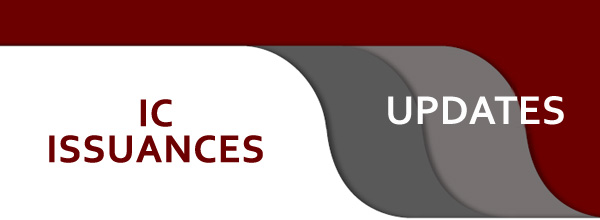
IC Circular Letter 2022-09,
March 2, 2022
This provides for the guidelines on the licensing requirements of Insurance and/or Reinsurance Brokers engaged in Health Maintenance Organization (HMO) Business.
This provides for the guidelines on the licensing requirements of Insurance and/or Reinsurance Brokers engaged in HMO Business, as follows:
- An individual must have at least three (3) years of experience in the HMO industry and occupying a managerial position or licensed as a general agent for at least three (3) years to be qualified as a Soliciting Official.
- No person licensed as an insurance agent, HMO agent or general agent shall be licensed as an insurance/HMO broker, nor shall a person licensed as an insurance/HMO broker be licensed as an insurance agent, HMO agent or general agent.
- No official or employee of an insurance/HMO broker shall be licensed to act as an insurance agent, HMO agent or general agent.
- No broker or its stockholders and officers shall have controlling interest in any insurance or reinsurance company, HMO or insurance adjustment company or vice versa.
- The applicant shall pay a licensing fee in the amount of Php90,900.00 upon approval of the application for issuance of new or renewal of license as an HMO broker with one (1) Soliciting Officia. ln case there are more than one (1) Soliciting Official, the applicant shall pay a licensing fee of Php30,300.00 for each additional Soliciting Official.
IC Circular Letter 2022-10,
March 2, 2022
This provides for the revised guidelines on online submission of requests for approval of Products/Forms or any other related requests.
All requests for approval of products/forms and such other related requests of life insurance companies, Mutual Benefit Associations (MBAs), pre-need companies, and Health Maintenance Organizations (HMOs) shall be submitted to the Insurance Commission through the Actuarial Division's Online Product Submission Portal.
Each submission must be accompanied by the following:
1. Transmittal letter, duly signed by an authorized representative of the company;
2. One (1) copy each of the documentary requirements as required under pertinent circulars such as Circular Letter Nos. 2016-10, 2017-19 and 2019-72.
- The documents which are required to be executed and submitted under oath shall be submitted in notarized form.
- Scanned copies of such documents shall be uploaded to the Actuarial Division's Online Product Submission Portal.
- The transmittal letter and all other documents to be submitted through the Portal must contain the necessary signatures.
- Electronic images of wet or physical signatures will suffice.
- Payments can be made online through the ePayment System of the SEC by selecting FILING FEE - PRODUCT APPROVAL as transaction type, subject to the Insurance Commission’s existing guidelines on electronic payment. While online payments are encouraged, payments can still be made over the counter.
- After payment, a scanned copy of the Official Receipt and validated OPF or payment confirmation, shall be submitted via email to This email address is being protected from spambots. You need JavaScript enabled to view it.
IC Circular Letter 2022-14,
March 14, 2022
This provides for the Adoption of Philippine Financial Reporting Standards (PFRS) 4 – Insurance Contracts.
The relevant rules and regulations are as follows:
- All government-owned or-controlled corporations or entities engaged in social or private insurance or simply referring to Government Insurance Institutions (GIIs) shall adopt the requirements of PFRS 4 - Insurance Contracts on classifying, measuring, recognizing the contractual obligations and the appropriate presentation and disclosure requirements on the statutory reporting and AS submission to the Commission.
- GIIs covered shall apply the financial reporting framework issued by the Commission on Audit (COA) in preparing their general purpose financial statements.
- The general-purpose financial statements as audited by the COA shall be used as basis for the preparation of the AS, which will be subjected to examination of the IC.
This Letter shall apply for annual periods beginning on or after January 1, 2023.
For the purposes of the transition requirements of this Circular:
a. the date of initial application is the beginning of the annual reporting period in which an entity first applies PFRS 4; and
b. the transition date is the beginning of the annual reporting period immediately preceding the date of initial application.
An entity shall apply PFRS 4 retrospectively unless it is impracticable to do so.
IC Circular Letter 2022-17
March 18, 2022
This provides for the guidelines on materiality threshold to be applied by external auditors/auditing firms.
For the purpose of evaluating whether the information is material, quantitative and qualitative tests shall be applied by the external auditors and/or auditing firms:
Quantitative Test
a) Deficiency or inconsistency in the disclosures of the financial statements and misstatements that may result from a deviation from prescribed policy, misrepresentation, fraud or error shall be considered material if the information involves a transaction, amount or account that represents:
• Ten percent (10%) or more of the total of related accounts or transactions for Insurance Commission Regulated Entities (ICRE), non-publicly listed and not part of a multinational company; and
• Five percent (5%) or more of the total of related accounts or transactions for ICRE, publicly listed and/or part of a multinational company.
b) Based on the circumstances identified by the Commission, materiality of the deficiency and misstatement in relation to the total assets or total liabilities may be considered.
c) ln resolving the issue of violation, due regard shall be given to the written explanation of the external auditor as to his basis in determining materiality and the exercise of professional judgement in issuing his audit opinion on the questioned financial statements.
Qualitative Test
ln order to identify material misstatement or error, qualitative factors shall be considered which involve determination whether the misstatement, fraud or error:
a) Affects the economic decisions of primary users of the financial statements;
b) Affects the overall accuracy of the financial statements;
c) Affects the entity's compliance with covenants under debt or similar agreements, regulatory requirements or contractual requirements of operation and other agreements;
d) Relates to the incorrect selection or application of an accounting policy that has immaterial effect on the current period's financial statements but is likely to have a material effect on future periods' financial statements;
e) Disguises a change in earnings or other trends, especially in the context of general economic and industry conditions;
Represents a recurring misstatement that is likely to continue in future periods;
a) Increases management compensation or creates an award that otherwise would not have been achieved;
b) ls significant to users of the financial statements (e.g., in relation to forecast earnings);
c) Affects key ratios monitored by analysts or other key users of the financial statements; and
The external auditor and/or audit firm shall include any discovered material deficiencies or inconsistencies in the disclosures and material misstatements resulting from deviation from prescribed policy, misrepresentation, fraud or error in the report to be submitted directly to the Financial Examination Group (FEG) of the IC within 15 calendar days upon discovery.
IC LO-2022-09
March 23, 2022
This is a request for a legal opinion on queries regarding its designation as a policyholder
of the group insurance.
The following are the queries and answers regarding its designation as a policyholder of the group insurance:
1. Whether the lending company is allowed or is not prohibited under the Insurance Code or its rules to act as policyholder in a group policy covering its customers?
YES. Considering that lending companies were expressly mentioned in Section 1.2 and are clearly classified as part of the Affinity group, the client-lending company is therefore allowed to act as a policyholder in a group policy covering its customers.
2. Whether the lending company as policyholder of the group policy is not required to be licensed as an insurance agent?
NO. The client-lending company as a policyholder of a group policy is not required to be licensed as an insurance agent. Section 1.7 of the IC CL no. 2017-57 valid certificate of registration from the Securities and Exchange Commission. However, it must be noted that the certificate requirement does not apply to recognized and legal foreign entities which have offices or branches in the Philippines such as diplomatic, foreign or international organizations.
3. Whether the lending company is authorized or is not prohibited from collecting a service fee from the insurance company for providing services in the administration of the group policy for its customers?
YES. Section 5.5 of the IC CL no. 2017-57 is clear in authorizing and allowing a policyholder to collect service fees from the insurance company for providing services in the administration of the group policy for its customers, stating that
"a service fee or collection fee may be paid by the Insurer to the policyholder. is understood that the payment of a fee or collection fee to the policyholder is necessary to help defray the costs for servicing and administering the plan" However, please note that a service fee or collection fee is not a matter of right which can be required from the insurer as this would still be subject to an agreement between the contracting parties.

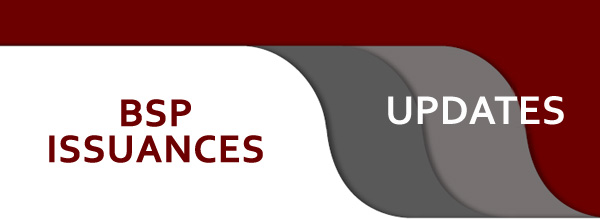
BSP Circular No. 1139,
March 23, 2022
This provides for the guidelines for reporting Islamic Banking and Finance Transactions / Arrangements.
As a general rule, the provisions of existing regulations under the MORB, as well as other standards of conduct prescribed by the BSP for conventional banks shall also apply to an (Islamic Bank) IB and (Islamic Banking Unit (IBU) of a conventional bank, unless otherwise expressly specified.
The funds of the IBU shall not be invested in, or commingled with other funds held by, the conventional bank. The books and records of the IBU shall contain full information relative to its lslamic banking and financing transactions and activities and shall be kept separate and distinct from the books and records of transactions performed by the other departments/units of the conventional bank.
BSP CL-2022-021,
March 7, 2022
This provides for the Anti-Money Laundering Council (AMLC) Resolution No. TF-50, directing the issuance of Sanctions Freeze Orders (SFO) against certain identified organizations pursuant to their designation as terrorists.
AMLC Resolution No. TF-50 directed the issuance of Sanctions Freeze Orders (SFO) to take effect immediately against certain identified organizations pursuant to their designation as terrorists by the Anti-Terrorism Council (ATC) and the freezing without delay of the following property or funds, including related accounts:
(a) property or funds that are owned or controlled by the subject of designation, and is not limited to those that are directly related or can be tied to a particular terrorist act, plot, or threat;
(b) property or funds that are wholly or jointly owned or controlled, directly or indirectly, by the subject of designation;
(c) property or funds derived or generated from funds or other assets owned or controlled, directly or indirectly, by the subject of designation; and
(d) property or funds of persons and entities acting on behalf or at the direction of the subject of designation.
BSFIs are reminded to submit to the AMLC:
(a) a written return, pursuant to applicable laws and regulations; and
(b) suspicious transaction report on all previous transactions of the subjects of designation within five (5) days from effectivity of the SFO.
BSP CL-2022-026,
March 15, 2022
This informs all BSP-Supervised Financial Institutions (BSFIs) of the Financial Action Task Force (FATF) Publications on High-Risk and Other Monitored Jurisdictions.
This is to inform all BSFIs of the updated statements of the FATF on high-risk jurisdictions subject to a call for action and jurisdictions under increased monitoring:
1. High-Risk Jurisdictions subject to a Call for Action:
a. On Democratic People’s Republic of Korea (DPRK) – The FATF calls on its members and urges all jurisdictions to advise their financial institutions (FIs) in their respective jurisdictions to give special attention to business relationships and transactions, directly or indirectly, with the DPRK, including DPRK companies, FIs, and those acting on their behalf.
b. On Iran – The FATF fully lifts the suspension of counter-measures and calls on its members and urges all jurisdictions to apply effective countermeasures against Iran.
2. Jurisdictions under Increased Monitoring - The FATF has issued an updated list of jurisdictions under increased monitoring or with strategic deficiencies. These countries are actively working with the FATF and have committed to resolve swiftly the identified strategic deficiencies in their regimes to counter money laundering, terrorist financing, and proliferation financing within agreed timelines and are subject to increased monitoring.
BSP M-2022-013,
March 2, 2022
This provides for the guidelines on the designation of the Philippine Domestic Dollar Transfer System (PDDTS) and PhP-USD Payment vs. Payment System (PvP) as Systemically Important Payment Systems (SIPS).
All participants of the PDDTS and PvP shall, at a minimum, comply with the following guidelines:
a. Participate in BSP surveys to assess safety, efficiency, and reliability of the payment system, including the performance of service by the operator of the designated payment system (ODPS);
b. Submit reports and/or information as required or requested by the BSP to facilitate evaluation of the PDDTS, the PvP and/or the national payment system;
c. Make available during regular onsite examination/assessment conducted by the BSP', with prior written notification to the participants concerned, relevant documents and information to evaluate the activities related to the payment system;
d. Provide necessary information as requested by the Governing Body or the ODPS to facilitate compliance with reporting requirements under relevant laws and regulations;
e. Ensure that the PDDTS and/or PvP rules and policies they agree to are aligned with the principles relevant to SIPS;
f. Adhere to the rules, standards and requirements promulgated by the BSP and fulfill their respective roles to ensure safety, efficiency, and reliability of the PDDTS and PvP, including participation in exercises or activities, such as testing conducted by the ODPS; and
g. Comply with BSP policy issuances primarily directed at all participants of a payment system or specific to their role in the PDDTS and PvP.
In addition, participants who also perform certain specified roles shall likewise comply with the guidelines set forth in accordance with their respective role/s.
BSP M-2022-015,
March 22, 2022
This recommends control measures against cyber fraud and attacks on retail Electronic Payments and Financial Services (EPFS).
BSFIs are advised to adopt the following supplementary control measures:
1. Removal of clickable links in emails or SMS sent to retail customers followed by an information campaign that the BSFI will no longer be sending clickable links.
2. Customer notification through existing mobile or email registered with the BSFI whenever there is a request to change a customer’s mobile number, email address, or account credentials.
3. After the conduct of a thorough risk analysis and assessment, the implementation of the following controls:
a. Mandatory fund transfer transaction notification to customers through SMS and/or email for transactions exceeding a predefined amount;
b. Holding period or delay before activation of a new soft token on a mobile device; and
c. Cooling-off period before the implementation of requests for key account changes such as those for the mobile number and email address.
4. Personalized SMS/Email OTP messages for device registration, fund transfer, and profile update, among others.
5. Restriction to any BSFI officer or representative from manually obtaining or inquiring about critical authentication information such as customer password and/or one-time password/pin (PIN).
6. Creation of dedicated and well-resourced customer assistance teams that deal with feedback on potential fraud cases on a priority basis.
7. Conduct of regular customer education campaigns against online scam and phishing schemes with mechanisms to monitor their effectiveness and relevance; and
8. Adoption of strong fraud surveillance mechanisms to ensure prompt responses in dealing with the growing threat of online scams.
BSP M-2022-016,
March 22, 2022
This provides for Application Programming Interface (API) security control recommendations.
To aid in strengthening controls on API and interconnections, BSFIs are strongly advised to implement the following good practices for API management:
1. Ensure strong authentication and authorization mechanisms through in-depth evaluation of API architecture and security standards.
2. Encrypt sensitive API payload data using industry-accepted encryption standards and versions.
3. Ensure that only necessary data/information are contained in API responses.
4. Perform validation, filtering, and sanitization of all client-provided data and other data originating from integrated and partner systems.
5. Ensure that system and audit logs capture failed attempts, denied access, input validation failures, or any failures in security policy checks.
6. Regularly update API inventory, purpose, and documentation to appropriately manage deprecated API versions and unintentional endpoint exposure.
7. Conduct regular assessments, hardening, and patching of all API servers.
8. Conduct regular security tests using API and business logic exploits such as but not limited to SQL injection, replay attacks, and logic bypass.
9. Enforce thresholds and rate-limiting API calls to prevent distributed denial-of-service (DDoS) attacks.
Likewise, BSFIs should consider the following controls and processes supporting the operation, connectivity, and endpoint security of APIs:
1. IP Address filtering for third-party partner integrations.
2. Compliance audits with BSFI APIs security standards.
3. Implementation of a Web Application Firewall (WAF) in front of API resources by validating and monitoring API traffic to protect core applications.
4. Strengthening endpoint protection, particularly on mobile applications connecting through APIs, to prevent unauthorized API connections and static/dynamic code analysis. d. Ensuring that potential reconnaissance/footprinting of previous mobile application versions are addressed upon implementation of additional security controls.
5. Clearly define and delineate roles and responsibilities on information security and cybersecurity for API interconnectivity between BSFIs and partners.
The controls specified herein are not exhaustive.

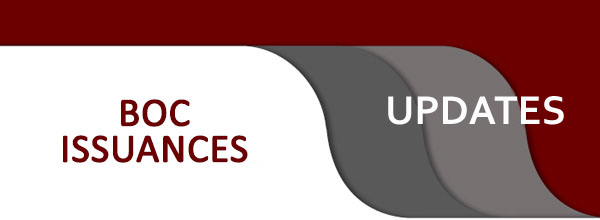
CMC No. 41-2022
March 2, 2022
This provides for the extension of the transitory period and provision of interim guidelines for the implementation of FDA circular no. 2020-025 through the issuance of FDA circular No. 2021-011-A.
The transitory period for full implementation of FDA Circular No. 2020-025, which provides the guidelines for the licensing and registration of Household/Urban Hazardous Substances (HUHS) establishments and products, respectively, shall be extended from January 22 to December 31, 2023 by virtue of FDA Circular No. 2021-011-A. However, this transitory period shall not apply to licensing of HUHS establishments. It is applicable only to HUHS Product Registration wherein companies are allowed to continue with the manufacture, importation, exportation, distribution, sale, offer for sale, transfer, promotion, advertisement and/or sponsorship of their HUHS products not yet registered with FDA as long as they have managed to secure a License to Operate as HUHS establishment.
For the purpose of importation of HUHS products intended to be placed in the market, the following documents must be presented before the BOC for the purpose of clearing shipments containing HUHS products:
1. A valid LTO as HUHS Distributor-Importer; and
2. A copy of FDA Circular No. 2021-011-A (in lieu of an FDA-issued valid Certificate of Product Registration)
.

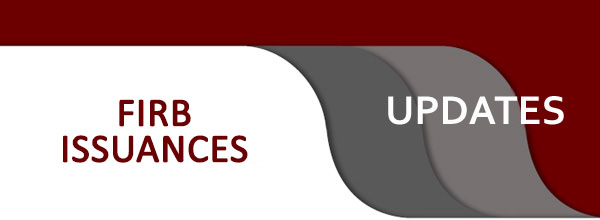
FIRB Resolution No. 006-22,
March 21, 2022
This clarifies the period of imposition of penalty for violating the conditions prescribed under FIRB Resolution 19-21.
The following are the clarifications resolved by the Board:
- The penalty for non-compliance with the provisions found in FIRB Resolution No. 19-21 shall be effective from September 13, 2021, until the expiration of the effectivity of FIRB Resolution No. 19-21.
- All projects or activities must be conducted inside the economic zone or freeport pursuant to Section 309 of the NIRC of 1997, as amended.
- The FIRB may cancel, withdraw, or suspend the enjoyment of fiscal incentives of concerned RBEs for violating any provisions of the CREATE Act pursuant to Section 297 (E) thereof.
- The work arrangement found in FIRB Resolution No. 19-21 for RBEs in the IT-BPM sector shall be allowed until March 31, 2022 only.

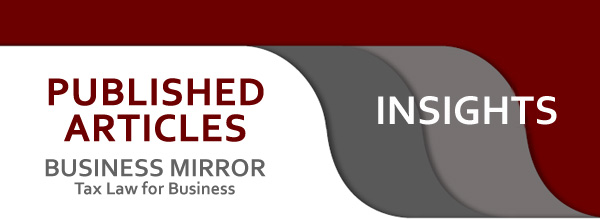
REGULATING NFTs: A TAX PERSPECTIVE
By Atty. Jomel N. Manaig
The younger generations of Filipinos have always been tech-savvy. From the latest social media crazes to the advancement of cryptocurrencies, we are consistently treated as digitally-forward. Enter: Non-Fungible Tokens (NFT).
NFTs, according to the Bangko Sentral ng Pilipinas, generally represent a class of virtual asset that differs from traditional cryptocurrencies in that an NFT establishes ownership over a unique asset. This characteristic of uniqueness captures the non-fungibility aspect of NFTs. However, even if a definition was given, the BSP still has no specific rules and regulations for NFTs.
This absence of specific rules and regulations extend to other government agencies like the Bureau of Internal Revenue. Although RMC No. 60-2020 mandates the registration of persons conducting business through any forms of electronic media, there is no detailed roadmap on how to tax NFT transactions. But, as certain as the sun rising, we have to keep in mind that tax is our constant companion even in the digital realm.
In this article, we will seek to apply basic tax concepts in the sale and purchase of NFTs.
It is important to note that an NFT is still considered as a property. For tax purposes, a property may be classified as an ordinary asset or a capital asset. This distinction is important since it will determine the taxation of the NFT.
If the NFT of a taxpayer is part of the stock in trade, is included in inventory, is held primarily for sale to customers in the ordinary course of trade or business, or is used in trade or business from which an allowance for depreciation is recognized, then it will be considered as an ordinary asset. The sale of such NFT should result into an ordinary income and be subjected to income tax, after the deduction of ordinary and necessary expenses, at the regular income tax rate applicable to individuals or juridical entities, as the case may be.
In addition, the sale would also be subject to VAT or other percentage tax, whichever is applicable, since such sale, barter, or exchange is considered as having been done in the course of trade or business.
On the other hand, if the NFT does not fall within those considered as an ordinary asset, it shall be considered as a capital asset. In the absence of a specific provision in the Tax Code, as amended, providing for special income tax rates on passive income, the taxpayer shall recognize capital gains or losses from the sale of the NFT.
In taxing such capital gains or losses, only those generated from the sale or exchange of capital assets shall be considered. The net capital gains, or the excess of the gains from sales or exchanges of capital assets over the losses from such sales or exchanges, shall form part of the taxable income of the taxpayer. Meanwhile, for capital losses, the deductibility shall be allowed but only to the extent of the gains from such sales or exchanges.
Since the subject of the sale or exchange is a capital asset, it shall not be subject to a VAT or percentage tax.
Despite the application of general tax principles, there are still a lot of questions that must be resolved to effectively tax NFTs.
For one, determination of gains from sale of NFT is relatively easy if facilitated through a fiat currency, but how is such determination going to be if the purchase is done using cryptocurrency? It should be noted that a cryptocurrency is still technically a property. Therefore, exchanging an NFT for a cryptocurrency is a barter. The tax consequences of a barter transaction are greatly affected by the appreciation or depreciation of the properties involved.
Another question which may impact the taxation of NFTs is the effect of licenses or royalties due from the copyright and the rights to intellectual property over the NFT. How will this impact the sale and transfer of the NFT from one owner to another?
With the public’s earnest exploration of new digital advancements, including NFTs, government regulators must keep up and stay up to date with these developments.
----------------------------------------------
For inquiries on the article, you may call or email
ATTY. JOMEL N. MANAIG
Junior Partner
T: +63 2 8403 2001 loc. 380
This email address is being protected from spambots. You need JavaScript enabled to view it.



DISCLAIMER: The contents of this Insights are summaries of selected issuances from various government agencies, Court decisions and articles written by our experts. They are intended for guidance only and as such should not be regarded as a substitute for professional advice.
Copyright © 2022 by Du-Baladad and Associates (BDB Law). All rights reserved. No part of this issue covered by this copyright may be produced and/or used in any form or by any means – graphic, electronic and mechanical without the written permission of the publisher.





